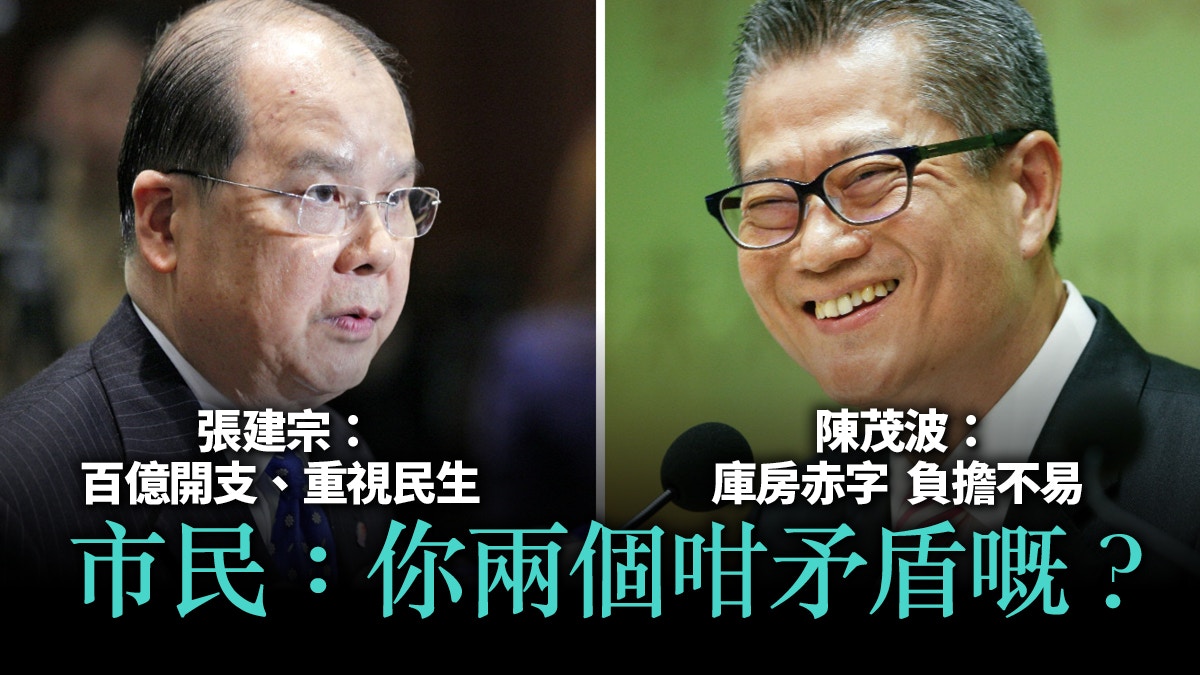01 perspective
Written by: Comment Editor
2020-01-21 13:07
Last updated: 2020-01-21 13:07The Budget will be announced next month. On the one hand, the Financial Secretary, Chen Maobo, promised to expand fiscal expenditures to support the local economy and help the people to bail out. On the other hand, he still feared to increase recurrent expenditures, reflecting the failure of the Secretary to give up his role as a miser. Lead Hong Kong to find new economic growth points and get out of the predicament.
Chen Maobo ’s blog post on Sunday (19th) reiterated that due to the rapid aging of the population and the improvement of the quality of public services by the government, the recurrent expenditure in the past ten years is far higher than the increase in income. Following this trend, there will be a structural deficit in public finances and it will not be easy for society to afford. Therefore, he disagrees with measures such as allocating money. In the text, Chen Maobo has many taboos about the well-being of people's livelihood. He is afraid of the rapid depletion of reserves. He also prefers to take short-term measures to deal with economic fluctuations and lacks long-term vision.
Expenditure growth is much higher than income growth?
The blog emphasized that "the government's recurrent expenditure has increased significantly in the last ten years, and it is much higher than the increase in revenue." However, it has not clearly specified whether the revenue is operating income or government revenue. Operating income includes taxes, rates, government fees, and investment income from the Land Fund. If calculated based on this, from 2009/10 to 2019/20, the cumulative increase was 77.7%, and the cumulative increase in recurrent expenditure during the same period was 99.4%. This difference is likely to widen, coupled with the new relief measures introduced this year, and recurrent expenditure will also be expanded.
Government revenue plus non-operating income such as the Capital Works Reserve Fund, if calculated on this basis, from the 2009/10 to 2019/20 budget year, the cumulative increase was 96.6%, which is slightly lower than the cumulative increase in current expenditure during the same period. Moreover, the cumulative income growth from 2009/10 to 2018/19 is higher than the current expenditure, and it will not lag behind until 2019/20.
Even accepting the government ’s statement, the cumulative increase in recurrent expenditure over the past decade outperforms the cumulative increase in government revenue, it does not mean that the government should tighten its spending on livelihood. First, the government's spending in the past has been too modest, and it has missed the opportunity to invest resources early to alleviate social problems and accumulate various social problems. Second, reserves have been increasing from 2003/04 to 2018/19, which is sufficient to meet new expenditures.
The government has a responsibility to make good use of public finances, and must not "open positions and send rice" to save popular hope. However, Chen Maobo must bear the responsibility for necessary people's livelihood expenses, instead of treating it as a financial "burden", hoping to be covered by "one-time non-recurring expenses" that "have a relatively small long-term impact on fiscal sustainability. Furthermore, over the past ten years, the government has introduced a number of short-term relief measures, such as increasing subsidies, subsidies, relief of public housing rents, and rates, etc., and their effects have been close to normal measures. In order to make the livelihood and welfare measures more stable and the government easier to budget, "one-off" measures are more suitable for transition to recurrent expenditure.
Just as the Chief Secretary for Administration Zhang Jianzong emphasized in a blog on the same day, he decided to “handle the deep-seated contradictions of the society” with ten measures to improve the people ’s livelihood. Elderly policies, such as supporting the full implementation of the retirement protection for the whole people, to avoid the deterioration of the elderly's poverty and accumulate social conflicts.
Planning for growth leads to Hong Kong at its source
The Financial Secretary is worried about long-term finances and he is right, but what Chen Maobo should do is to lead Hong Kong to find new points of economic growth. In addition to the responsibility of the government, the government must drive the advantaged industries to survive, and Hong Kong urgently needs an industrial structure reform to reshape the economy. On the one hand, it creates employment opportunities and, on the other hand, provides a stable financial source for the government.
Finance and related professional services are Hong Kong's pillar industries. We must consolidate our advantages. At the same time, the quality of medical and scientific research in Hong Kong is very good, and there are great conditions to promote the development of Hong Kong. We do not expect the medical and technology industry to become a lifesaver at one-and-a-half minutes. The commercialization of scientific research in Hong Kong is slow, the laws are out of date, the rents and living expenses are expensive, hindering the development of innovative technology and hindering the revival of Hong Kong's industry. As for medical treatment, local technology and service quality are very well-known, but the industry is too busy to take care of local patients and cannot rashly industrialize it. The government should first strengthen its position, actively solve problems for the medical technology sector, and then vigorously promote the industry.
On Monday (January 20), Moody's downgraded Hong Kong due to the government's weak response to anti-revision demonstrations. Although the observations of individual rating agencies are not comprehensive, they should at least remind the government that the political deadlock and street conflicts resulting from the revisions have not yet been resolved. To regain the confidence of Hong Kong and local people, and to feel comfortable developing in Hong Kong, the Lam Cheng Government must do more.
01 depth
Chen Maobo's Budget 01 Viewpoints






